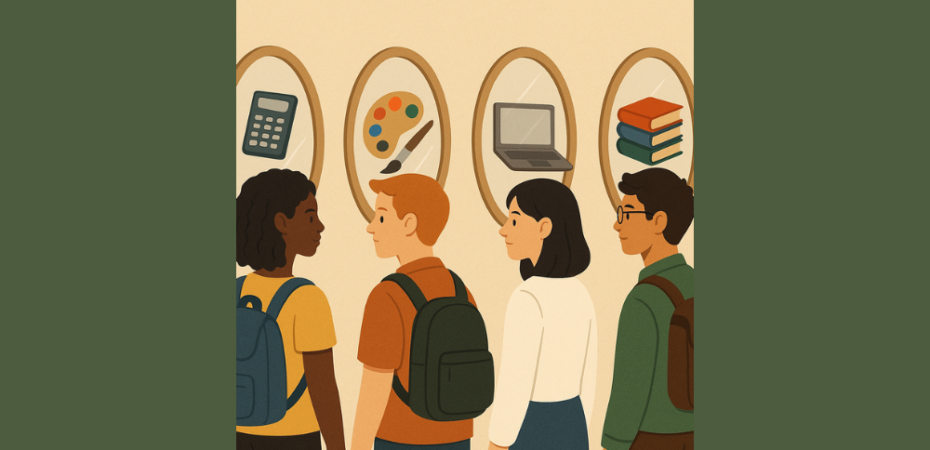
In this post, David McGregor reflects on his experience as a student in an interdisciplinary degree and explores some of the principles in the Interdisciplinary Learning and Teaching Manifesto, which he feels has most shaped both his personal and academic development. David has just completed his second year on the MA Interdisciplinary Futures programme. This post is part of the ‘Navigating complexity through interdisciplinary learning and teaching’ Hot Topic series.
Having recently completed my second year on the MA Interdisciplinary Futures undergraduate programme, reading the ‘Interdisciplinary Learning and Teaching Manifesto’ (Scoles, et al, 2024) offered a familiar and also fresh perspective on interdisciplinarity and its role in education. It prompted me to reflect on my experience so far. Eleven principles are identified as part of a manifesto for educators and learners. Among these are some of the things I have come to value most about learning in an interdisciplinary environment. Below, I expand on four of the principles.
Principle 2: The world’s inherent complexity ought to be honoured in learning environment
Unlike many discipline-specific academic environments, ours offers us the creative freedom to approach ‘challenge questions’ from a wide range of perspectives. I believe this flexibility honours their complexity. It’s always exciting to hear the diverse range of proposals that my peers bring forward in response to these challenge questions.
A pertinent example comes from our “Students as Change Agents” course, where we worked with “The Scottish Prevention Hub” on ‘How can we Reduce the Attainment Gap for Young People in Scotland?’. Despite working to address the same overarching challenge question, each group took a markedly different approach—from a children’s book that explores cultural differences within our society to an AI platform that expands subject choice in rural schools. The variety in these responses highlights the importance of fostering creative freedom and interdisciplinarity when approaching the world’s complex and multifaceted problems.
Principle 8: Students’ lived experiences and awareness of one’s own worldview can be more important than their disciplinary background
Over the past two years, learning, collaborating and co-creating in interdisciplinary environments, have affirmed the importance and value of this principle. At school and college, I spent less time studying than I should have, and instead, invested my time into activities that taught me lots about life, but didn’t attract many UCAS tariff points… So, when I started university, I would often question what relevant skills and knowledge I had to offer. Over time, however, after successful projects and collaborative experiences I began to recognise the value of my own lived experiences. These became tools for reflection and insight – particularly in interdisciplinary contexts where diverse perspectives are not only welcomed but essential.
It’s stimulating to observe how people approach tasks differently, often influenced by their background, culture or lived experiences. Being part of an environment that encourages students to draw on knowledge gained from all aspects of life – not just academic ones – has emphasised the powerful role that diverse worldviews play in tackling complex challenges.
Principle 10: Teaching should make space for clumsy and messy exploration
I love the wording of this principle as it really encompasses the way we are encouraged to try new things. Assessments aren’t usually an opportunity to experiment, but the pass/fail format allows us to do so without jeopardising our grades or drawing unhealthy comparisons. Some students aren’t as keen as I am on this, and have argued that without receiving grades and traditional critique, it’s difficult to gauge progress towards our honour’s years. I can understand this, but I jumped at the opportunity to write a short story and receive feedback on it. Creative writing has always interested me, but I never expected I would have the opportunity to explore it as part of my degree. The comments were both encouraging and critical and it was motivating to understand exactly where I succeeded and where I fell short in meeting the assessment criteria.
If our assessments were graded, I doubt I would have taken this risk. I’m not sure if I would submit a piece of creative writing during my honours years as it remains a largely unfamiliar area that I still lack experience in, but, because I have been encouraged to explore it as a mode for generating solutions, it is now something that I feel confident enough to consider going forward.
Principle 11: Learning will be, at times, uncomfortable and necessarily slow
The interdisciplinary teaching methods have created an academic environment unlike any other I have been in. We were told at the start of our course that to get the most from our learning, we would work in an environment that slows this process down. From a young age our learning is conditioned by more traditional pedagogies, so the benefits of this approach might not seem apparent at first; and it’s understandable that adjusting to this unfamiliar pace felt, for some, uncomfortable. It did seem counter intuitive, and naturally it has been met with some resistance based on expectations of the traditional demands of university.
I have since then developed my understanding of why this is an effective way to learn. For instance, “Reflections on Interdisciplinary Practice” is a class where this approach is practised. We developed skills such as reflecting, utilising University of Edinburgh’s Reflection Toolkit (The University of Edinburgh, 2024), and putting into practice reflective models such as Driscoll’s (1994) ‘What? So What? Now What?’. This has been a valuable tool in my academic and personal life, allowing me to learn more from experiences, and gain a better understanding of myself.
The way in which we learn during Reflections class is something that I appreciate. I have found this to be a tranquil space that offers respite from the often more intense workloads and traditional pedagogies of my electives. The slowed down nature of these classes and the types of reflective activities that we carry out evoke meaningful and sometimes challenging self-reflection, which at times have led me to learn things about myself. This process has helped me understand how I learn and how I collaborate with my peers, which has helped me make improvements in my communication skills and how I conduct myself in group projects. To maximise the gain from reflecting and slow learning, I’ve found that you must be honest with yourself, which at times, can be uncomfortable.
Overall, it’s an unfamiliar way of learning, and its benefits might not be apparent at first glance. Being the first cohort of an innovative and novel course is always going to come with uncertainties. For me, I’ve found comfort in accepting these uncertainties and am enjoying the process of being part of something new.
Our class is the first cohort of an innovative degree, and as such, there have been challenges in navigating our way through some of the uncertainties that come with it. However, we learn from these, and as part of our learning community I have had both personal and academic growth.
Read more about the Manifesto here: An Interdisciplinary Learning and Teaching Manifesto
References
Driscoll J. (1994). Reflective practice for practise. Senior Nurse, 13, 47 -50
The University of Edinburgh (2024). What? So what? Now what? [online] The University of Edinburgh. Available at: https://reflection.ed.ac.uk/reflectors-toolkit/reflecting-on-experience/what-so-what-now-what.
Overend, D., Choi, S., Cross, A., Cullen, C., Dures, S., Jay, D., Scoles, J., Winter, M. and Zhang, S. (2024). TILT: Toolkit for Interdisciplinary Learning and Teaching. University of Edinburgh. Available at: https://blogs.ed.ac.uk/tilt/
Scoles, J., Cullen, C. and Winter, M. (n.d.). ‘Interdisciplinary learning and teaching manifesto’. Available at: https://blogs.ed.ac.uk/tilt/wp-content/uploads/sites/10166/2024/11/TILT-manifesto.pdf
 David McGregor
David McGregor
David McGregor is a second-year student from Glasgow, studying the MA Interdisciplinary Futures programme at the University of Edinburgh. He has a particular interest in the current global climate crisis and enjoys applying creative thinking when collaborating and exploring complex challenges. Alongside his degree, he has been studying Spanish as an elective, using his university summers to immerse himself in Latin American culture. His extracurricular interests include training with and competing for the University Muay Thai Team, practising mixed martial arts, and developing his knowledge of general health, fitness, and nutrition.


